GENERAL DATA
Plant Parts: Root, stem, leaves, flower, and hydrosol
Cultivation mode: Wild collection/ Cultivated
In manufacturing: Pharmaceutical, Cosmetics, Herbal Tea, Hydrosol, Oil, Extract
Foods: Salad
🌿 Industries That Use Yarrow Herb (Achillea millefolium L.)
Yarrow is a versatile flowering herb with a long history of use across cultures. With its bitter aromatic leaves and feathery appearance, Yarrow contains volatile oils (chamazulene, cineole), flavonoids, alkaloids, and tannins, offering potent medicinal and therapeutic applications.
1. Pharmaceutical & Traditional Herbal Medicine
Yarrow is widely used in European, Native American, and Iranian traditional medicine for its astringent, anti-inflammatory, and wound-healing properties.
-
Wound & Bleeding Management:
Known as a “soldier’s woundwort,” yarrow herb was used to stop bleeding and disinfect wounds.
Applied topically in salves, poultices, or infused oils. -
Digestive Aid:
Stimulates appetite and digestion, helps relieve gas, bloating, and cramping. -
Women’s Health:
Used in herbal traditions to regulate menstruation, ease cramps, and relieve menopausal symptoms. -
Fever & Cold Remedies:
Promotes sweating (diaphoretic action), useful in breaking fevers.
✅ Delivered in tinctures, herbal teas, powders, or topical preparations.
2. Nutraceuticals & Herbal Tea Blends
Yarrow is a key ingredient in detox and immune-boosting formulations:
-
Bitter digestive teas and bitters formulations
-
Cold and flu herbal teas (with Elderflower, Peppermint, Echinacea)
-
Liver-cleansing or blood-purifying detox blends
✅ Often combined with Chamomile, Lemon Balm, or Calendula in wellness teas.
3. Cosmetic & Natural Skincare Industry
Thanks to its antiseptic and anti-inflammatory effects, yarrow is widely used in natural skincare:
-
Toners and astringent facial sprays for oily/acne-prone skin
-
Salves and creams for eczema, rashes, or wounds
-
Hair rinses for oily scalp or dandruff control
✅ Yarrow-infused oils and hydrosols are popular in artisan skincare.
4. Aromatherapy & Perfumery
Though less used than yarrow flowers or essential oil, the herb contributes to earthy, medicinal aromatic profiles:
-
Essential oil contains chamazulene (deep blue) and cineole
-
Featured in healing blends, aromatherapeutic oils, and ritual incense
✅ Known for a grounding, herbal fragrance used in natural perfumery.
5. Folk & Ethnobotanical Applications
In folklore and rural medicine:
-
Believed to protect against evil spirits and disease
-
Used in love and divination rituals
-
Applied to cuts, bruises, and internal injuries in survival medicine
✅ Still valued in wildcrafting and traditional herbal practices.
6. Scientific & Academic Research
Yarrow’s phytochemical profile is of growing interest in:
-
Anti-ulcer, anti-inflammatory, and hemostatic research
-
Evaluation of flavonoids and alkaloids for therapeutic potential
-
Study of essential oil components in natural antimicrobials
✅ Frequently tested for applications in phytotherapy and ethnopharmacology.
✅ Summary of Key Applications
| Industry | Common Uses |
|---|---|
| Pharmaceutical & Traditional | Wound healing, digestive tonic, menstrual support |
| Herbal Teas & Nutraceuticals | Cold/flu teas, liver tonics, appetite stimulants |
| Cosmetic & Skincare | Acne toners, wound salves, eczema creams, scalp rinses |
| Aromatherapy & Perfumery | Medicinal aromatics, essential oil blends, earthy perfumes |
| Ethnobotanical Uses | Protective folk remedy, spiritual herbalism, survival medicine |
| Scientific Research | Studies on chamazulene, anti-ulcer and wound-healing effects |
🌱 Key Features of Yarrow Herb
-
Botanical Name: Achillea millefolium L.
-
Used Parts: Aerial parts (leaves, stems, and flowering tops)
-
Major Compounds: Chamazulene, flavonoids, tannins, alkaloids
-
Traditional Roles: Wound healer, digestive support, fever reducer
-
Forms: Dried herb, tea, tincture, powder, oil, essential oil
-
Color/Texture: Feathery green-gray foliage with white-pinkish flower tops
HARVEST CALENDAR
Feb
Mar
Apr
May
Jun
Jul
Aug
Sep
Oct
Nov
Dec
To order dried Milfoil petals, please contact us.
About Achillea Millefolium
It is a perennial plant whose height reaches eighty centimeters.
The stems of this plant are smooth, relatively narrow, and hairy, and their cross section is polygonal. There are fewer leaves on top of these stems.
The leaves have many branches, and each branch is divided into pointed and smaller parts, and it grows without a petiole. The surface of the leaves is covered with thin, delicate, and slightly sticky hairs.
The flowers are usually white and sometimes yellow and grow in the form of umbrellas at the end of the stems. Each flower usually has five petals that are completely separated from each other, oval and almost circular in shape. There are usually two gentle longitudinal grooves on the petals and three small teeth can be seen at their ends.
The scent of these flowers is very strong and their taste is bitter.
Bloodwort Health Benefits
Bloodwort is very helpful in treating uterine diseases. Drinking a decoction of 7 grams of these flowers, sitting in its decoction, or using its poultice, removes the urinary retention, opening (starting) menstruation, difficulty in childbirth, expulsion of the fetus from the body, adhesion of the cervix, swelling of the uterus, uterine ulcer and bladder stones.
Eating 5 grams of Yellow Yarrow flowers with honey is proven to expel stomach worms and Taenia. Drinking water soaked with 5 grams of it helps to cure fever.
Its decoction poultice is useful for removing nasal congestion, colds, and dizziness. The burnt powder of this plant dries the wounds.
A poultice of Common Yarrow root on the lower abdomen is useful for urinary retention and retention of menstruation.
Its hydrosol improves menstrual disorders, menstrual pain, intestinal and stomach swelling, rheumatism, and gout.
Milfoil Side Effects
It is harmful for Kidney.
Achillea millefolium Modifiers
Anise.
To order dried yarrow leaves, please contact us.

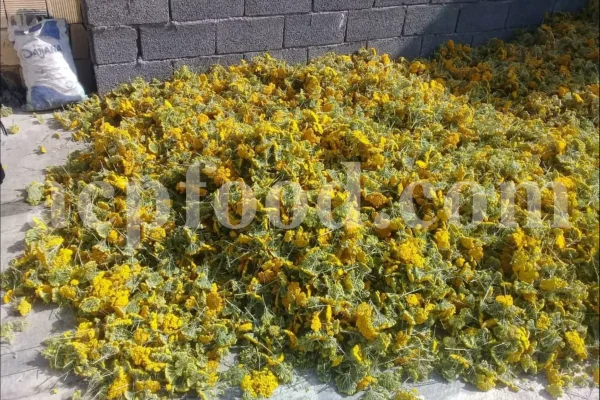
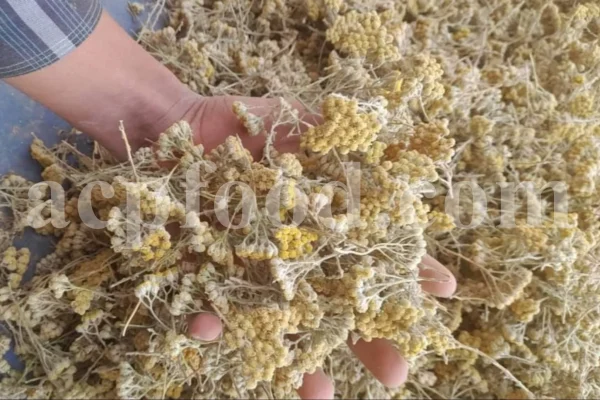
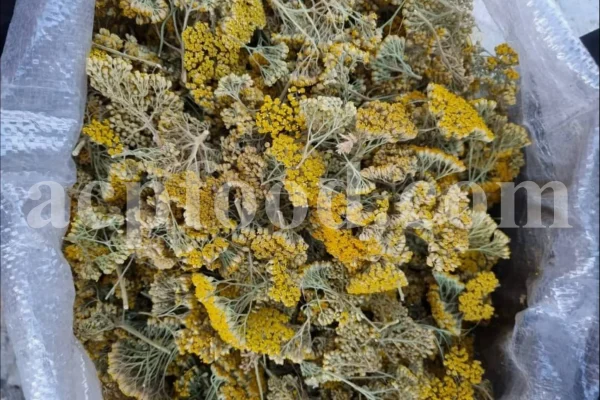
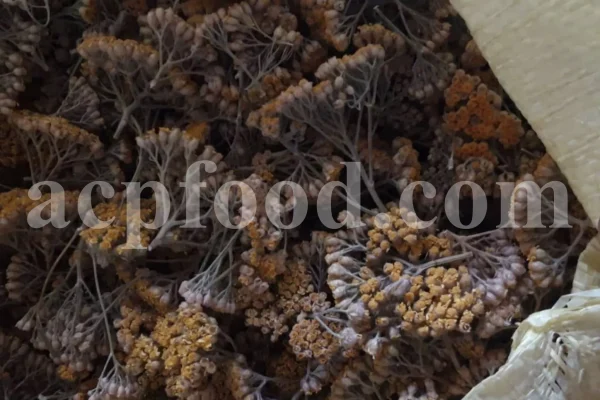
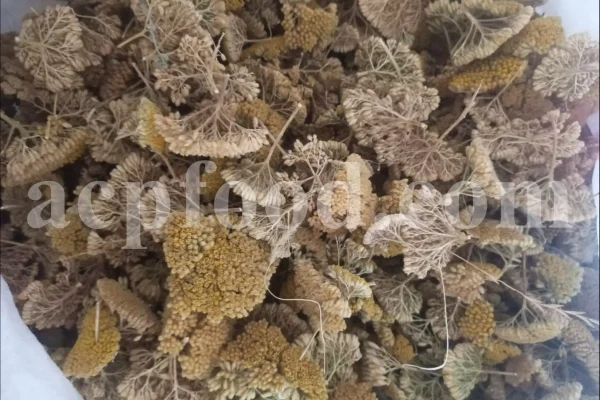
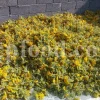
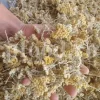


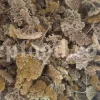
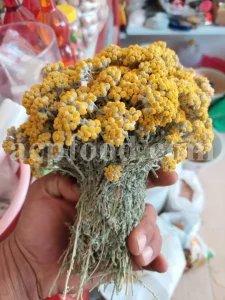
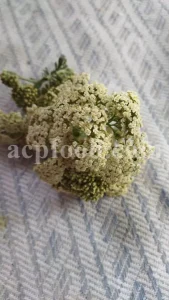
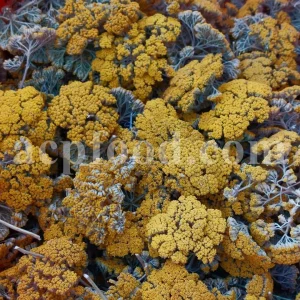
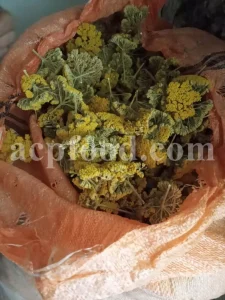
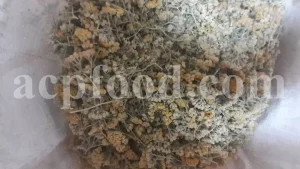
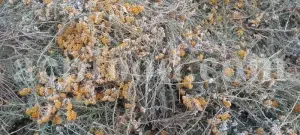
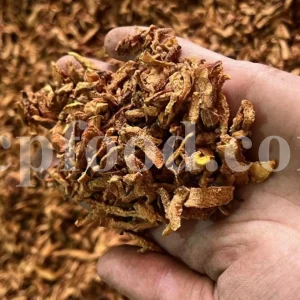
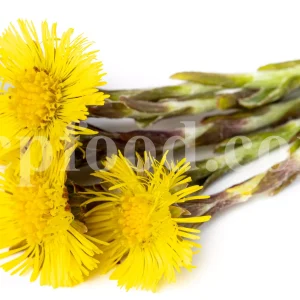
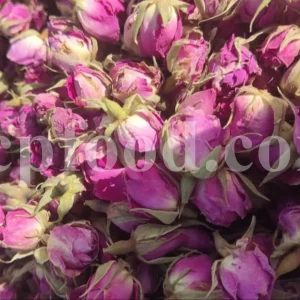
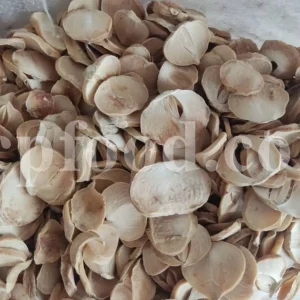
Reviews
There are no reviews yet.